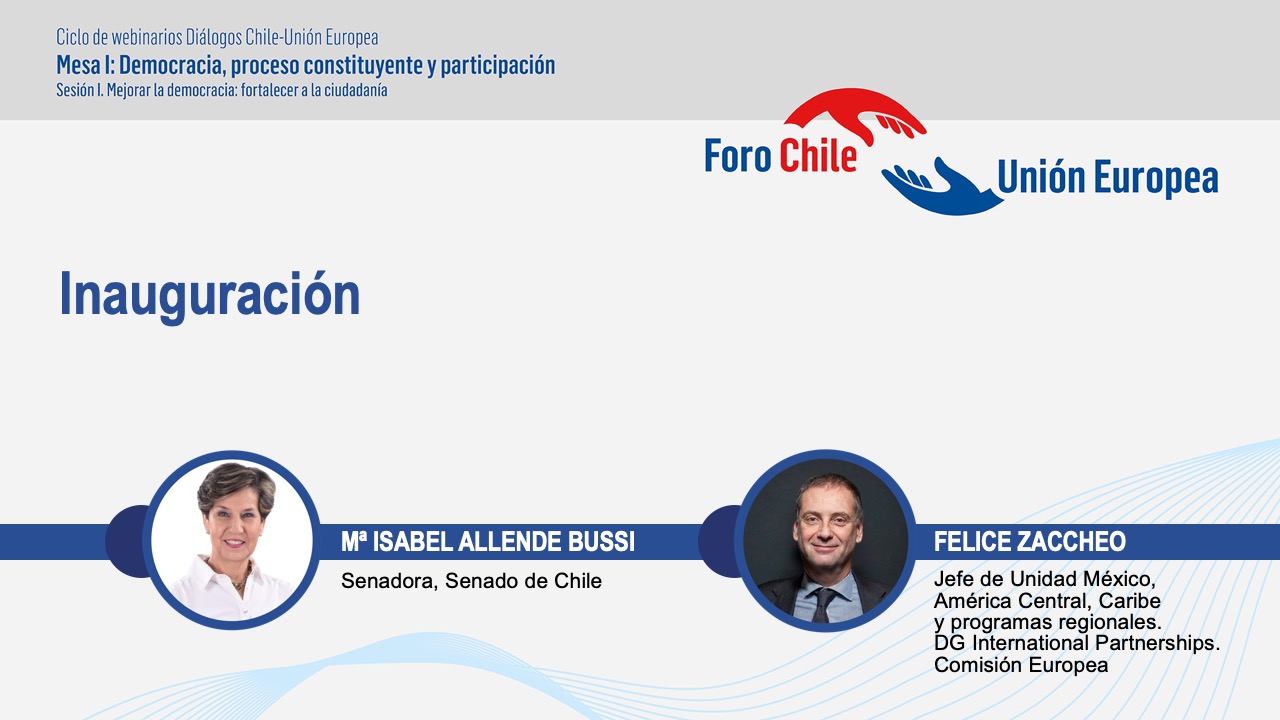The Delegation of the European Union in Chile, with the support of the EUROsociAL+ programme, the National Congress, through the Library of the National Congress and the Directorate of International Affairs of the Chamber of Deputies, organised a dialogue between European and Latin American experiences in the context of “Improving democracy: strengthening citizenship”.

Photo: Isabel Allende, Senate of Chile, and Felice Zaccheo, European Commission; officially opened this online technical discussion
In the framework of the first technical panel discussion Democracy, Constitutional Process and Participation, the first session, Improving Democracy: Strengthening Citizenship was held today. The intention is to share European and Chilean experiences on constitutional processes and on essential aspects that are common to the constitutions of the Member States of the European Union, including social cohesion, access to a welfare system and a sustainable development model.
Democratic systems and, therefore, the constitutions that found them, gravitate on three pillars that must be guaranteed simultaneously and to the highest extent: freedom (Rule of Law), real equality in the living conditions of citizens (Social State) and participation in decision-making (Democratic State).
Panel Discussion I will reflect on this latter aspect and will be divided into two sessions. The first session, will tackle the conceptual perimeter of classic and current demands required by the democratic principle for a new Constitution that aims to deal with this in greater depth. It is a question of analysing ―based on the trajectory and peculiarities of the Chilean political system and the best European experiences in this field― ways to improve the democratic circuit in general and, in particular, how to do it through mechanisms of direct participation of citizenship in political decision-making processes. The gender approach of the democratic principle will be an important part of the analysis.
At the start of this first session Improving Democracy: Strengthening Citizenship, Senator Isabel Allende said that: “Special attention for me represents that this new Political Constitution is built with a gender perspective, moving towards a parity democracy, being an important sign that the Convention has this characteristic. The inequality of women is not based on the argument of inferiority as has repeatedly been repeated throughout history, but is an arbitrary cultural construction that must be changed.”
The second speech at the inauguration was given by the Head of Unit for Mexico, Central America, the Caribbean and regional programmes of the Directorate-General for International Partnerships of the European Commission, Felice Zaccheo. In his address, he stated that: “In Chile, citizens have said that they want to work on a new social covenant. The European Cooperation wants to support this process by facilitating spaces for reflection and dialogue. The European experience, the lessons we have learned through our diversity that we have been gathering and redefining, with things done well and others less successfully, can be useful from a comparative perspective.
This speech was followed by contributions from the Chilean panellists: Pamela Figueroa Rubio, Academic of the Humanities Department at the University of Santiago de Chile with the topic Chile and the path towards a new Constitution: the Constitutional Convention and Francisco Soto Barrientos, Lawyer, associate professor at the Department of Public Law of the Law Department of the University of Chile with the topic Democracy and participation.Next came presentations by European panellists: Miguel Ángel Presno Linera, Professor of Constitutional Law at the University of Oviedo, with the topic Innovative experiences in Europe involving direct citizen participation and Blanca Rodríguez Ruiz, Professor of Constitutional Law at the University of Seville speaking on the topic Citizen parity as a horizon. Challenges and strategies.
The conclusions of this first session of the Technical Panel on Democracy, Constitutional Process and Participation were presented by Anabelén Casares Marcos, Professor of Administrative Law at the University of León and Víctor Soto, Researcher at the Department of Studies of the Library of the National Congress of Chile.
The second session ―Improving democracy: tightening the bond between governors and citizens― in March, will focus on improving the quality of representative democracy, focusing on its own ecology: the electoral system, the party system and the fight against corruption and incompetence.



